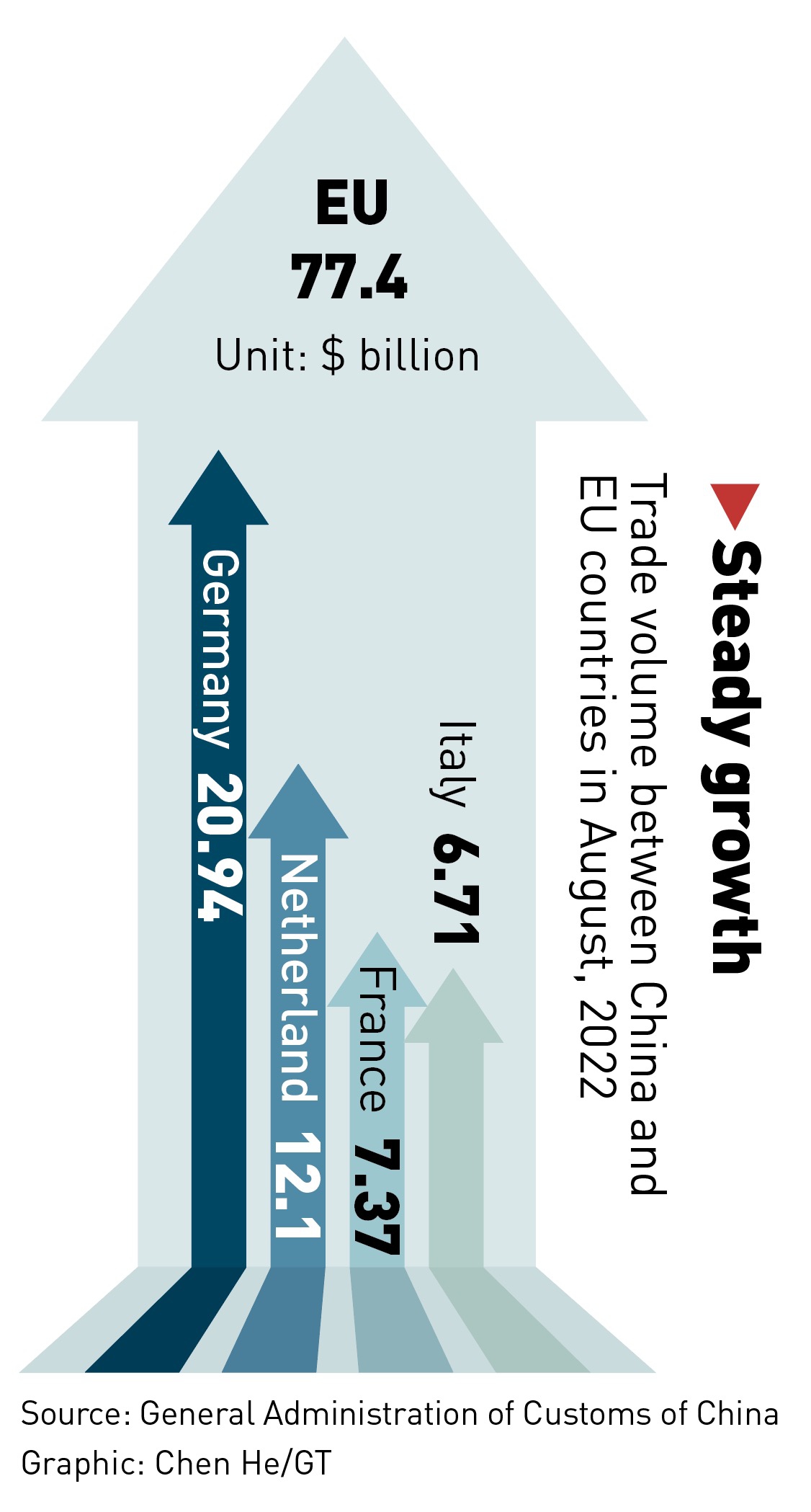China’s and Germany’s Prospects: Global Times Interview
China’s and Germany’s Prospects: Global Times Interviews Helga Zepp-LaRouche
Oct. 9, 2022 (EIRNS)—Ahead of the 20th National Congress of the Communist Party of China which convenes on Oct. 16, Global Times has published an extensive interview with Schiller Institute founder Helga Zepp-LaRouche, headlined, “China’s Economic Blueprint, Institutional Advantage Invaluable: German Scholar,” which it identifies as “the second piece of a series of GT’s interviews with influential scholars … to present a thorough picture of Chinese economy and BRI projects.”
Responding to a question on China’s economy, Zepp-LaRouche warned:
“The neoliberal financial system may disintegrate, either in a hyperinflationary disintegration—it would not happen in only one country—or if the central banks try to curb inflation through a ‘Paul Volcker style’ high interest rate policy, there could be a sudden chain reaction of bankruptcies of both emerging markets and over-indebted firms. While this will obviously affect China, its economic blueprint approach of caring for each segment of the economy with appropriate incentives will be invaluable….
“In China … the whole-process people’s democracy and its institutional advantage will allow for a real mobilization of all layers of the population, should China be faced with extraordinary challenges in the coming years.”
And to another, on Germany’s predicament, she answered:
“Top executives are already ringing the alarm bells, warning that Germany is about to crash into a wall and that its identity as an industrial nation is at stake. The straw that is about to break the camel’s back is the sabotage of the Nord Stream pipelines.
“The destruction of these pipelines means they cannot be re-opened as a fallback source, which means the energy crisis in Germany will get extremely serious in the short term with a great deal of social upheaval. The only way to solve the situation would be for all European nations to put an end to the sanctions against Russia, and throw all their weight into insisting on a negotiated solution for the Ukraine situation. This situation has moved beyond an energy crisis. A comprehensive approach is needed, which is why the Schiller Institute has called for a completely new international security and development architecture, which takes into account the interest of every single country on the planet.”
China’s economic blueprint, institutional advantage invaluable: German scholarBRI offers well-founded hope of overcoming povertyThe central business district of Beijing Photo: VCG
Editor’s Note:
The 20th National Congress of the Communist Party of China (CPC) is scheduled to convene on October 16. Ahead of the congress, the Global Times (GT) conducted an interview with Helga Zepp-LaRouche (HZL), founder of Germany-based political and economic think tank, the Schiller Institute, sharing her expectations for the 20th CPC National Congress, her views on China’s economic miracle over the last decade and how the China-proposed Belt and Road Initiative (BRI) will reshape global landscape.
This is the second piece of a series of GT’s interviews with influential scholars from Western think tanks that aim to present a thorough picture of Chinese economy and BRI projects.
GT: What is your perspective on Chinese economic development in the last decade? What impress you the most?
HZL: Increasingly over the course of the last decade, China has become the most important factor of stability in the strategic situation. Since China proposed the BRI in 2013, the economic policies of China have given developing countries the well-founded hope of overcoming poverty and underdevelopment.
This was only possible, because the spectacular rise of China is based on the sound economic principles of continuous application of the results of scientific and technological progress in order to improve living standards. This enabled China to end extreme poverty by the end of 2020, and contribute to three quarters of the poverty alleviation globally.
Since poverty is one of the most serious violations of human rights, it is no exaggeration to say that China has contributed more to the protection of human rights than any other country on the planet.
Another impressive aspect is that Chinese leadership has put a conception – a community with a shared future for mankind – on the table. Because that dialectical conception raises anyone who hears it or reads about it to think on a higher level and it is on that higher dimension where the mind can conceptualize creative new approaches to tackle problems.
GT: In your perspective, how will the 20th CPC National Congress chart China’s development for the next five years?
HZL: The congress will strengthen the Chinese perspective for a new paradigm in international relations. Especially now as geopolitical conflicts mount, the holistic and harmonious philosophy underlying China’s very different policy proposal is becoming more attractive to more countries. This is why the concept of a community with a shared future for mankind is supported by some 150 nations and international institutions, and why the Global Developement Initiative was openly welcomed by approximately 100 countries.GT: What role would CPC leadership and China’s institutional advantages play in the country’s development and help it overcome challenges?
HZL: As the figures on inflation continue to soar in the EU, the UK, the US and many other countries, China needs to take measures to protect itself against the effects of this increase in the cost of food, energy and other resources.
The neoliberal financial system may disintegrate, either in a hyperinflationary disintegration – it would not happen in only one country – or if the central banks try to curb inflation through a “Paul Volcker style” high interest rate policy, there could be a sudden chain reaction of bankruptcies of both emerging markets and over-indebted firms. While this will obviously affect China, its economic blueprint approach of caring for each segment of the economy with appropriate incentives will be invaluable.
In the Western “democracies,” politicians will not necessarily be reminded of their obligation to the common good. Although the explosion of costs and economic anxiety is adding to social tension, voters are only asked for their opinion every four years.
In China, on the contrary, the whole-process people’s democracy and its institutional advantage will allow for a real mobilization of all layers of the population, should China be faced with extraordinary challenges in the coming years.
Graphic: Chen He/GT
GT: In your perspective, how will China look in five years’ time? And how would China’s relations with Europe, and Germany in particular, move ahead in the next five years?
HZL: China will be very well integrated into a new international economic order, which will be based on completely different principles, with a focus on the physical aspects of the economy. The projects of the BRI will extend to all countries participating in it, severe poverty and hunger is expected to be eliminated in those countries, and many scientific projects allowing developing countries to leapfrog into more advanced countries will be underway.Concerning the relations between China and Europe, and Germany in particular, there are two fundamentally opposed options. If Germany acts as a vassal of the US, and sticks to a suicidal ecologist ideology, it will become a de-industrialized, miserable, and completely marginalized place.
If, however, Germany can somehow find the inner strength to fight for its own self- interest, and begins to cooperate with the Global South in the new economic system now taking shape, the European nation would have much to contribute to the new paradigm. So if Germany wants to remain an industrial nation, if Europe does not want to be completely sidelined, they need to advance multilateralism and participate in building a new and better world.
GT: The EU has been suffering from a bruising energy shortage, and how serious is the situation now in Europe and Germany, and is there any solution to resolve the crisis?
HZL: Top executives are already ringing the alarm bells, warning that Germany is about to crash into a wall and that its identity as an industrial nation is at stake. The straw that is about to break the camel’s back is the sabotage of the Nord Stream pipelines.
The destruction of these pipelines means they cannot be re-opened as a fallback source, which means the energy crisis in Germany will get extremely serious in the short term with a great deal of social upheaval. The only way to solve the situation would be for all European nations to put an end to the sanctions against Russia, and throw all their weight into insisting on a negotiated solution for the Ukraine situation. This situation has moved beyond an energy crisis. A comprehensive approach is needed, which is why the Schiller Institute has called for a completely new international security and development architecture, which takes into account the interest of every single country on the planet.
GT: There have been calls in Germany for pushing an economic decoupling with China, what is your comment on such decoupling calls? Do you think such calls will translate into actions in the next five years?
HZL: If Germany was now to be so suicidal as to give in to the pressure of certain countries, and to decouple from China, it would soon be turned into a formerly industrialized nation, with horrendous social consequences. This will be decided in the next months, not years.
GT: In your proposal, you mentioned building a New Bretton Woods System. What is the new system’s difference from the old one led by the West? And what role would developing economies, including China, play in the new system?
HZL: The proposal for a New Bretton Woods System would remedy the older one by providing credit lines with low interest rates for clearly defined development projects. It is a blueprint for a new world economic order, which would provide every continent with an infrastructure and development plan as the precondition for a modern industrialization.
The neoliberal financial system is about to blow out. We must now urgently put a new credit system on the agenda to avoid a collapse into chaos for most parts of the world. All of China’s proposals over the last decade, from the Asian Infrastructure Investment Bank (AIIB) to the New Silk Road Fund, go in this direction.















